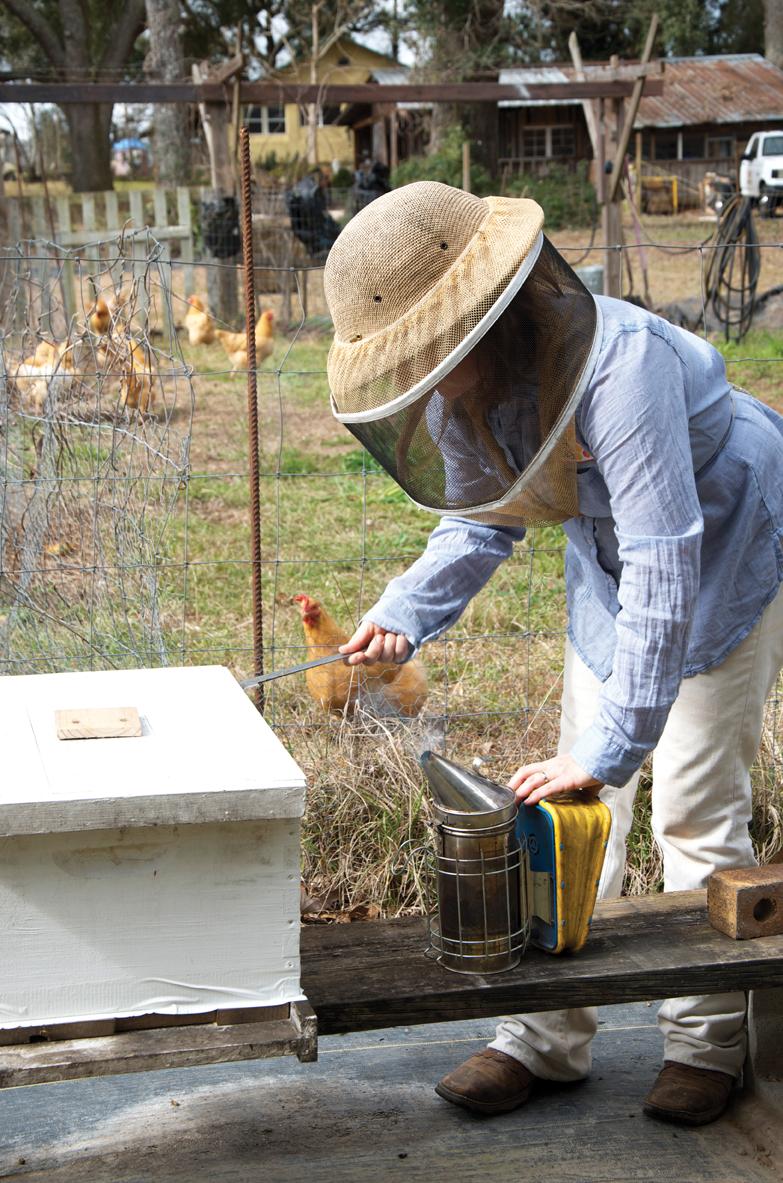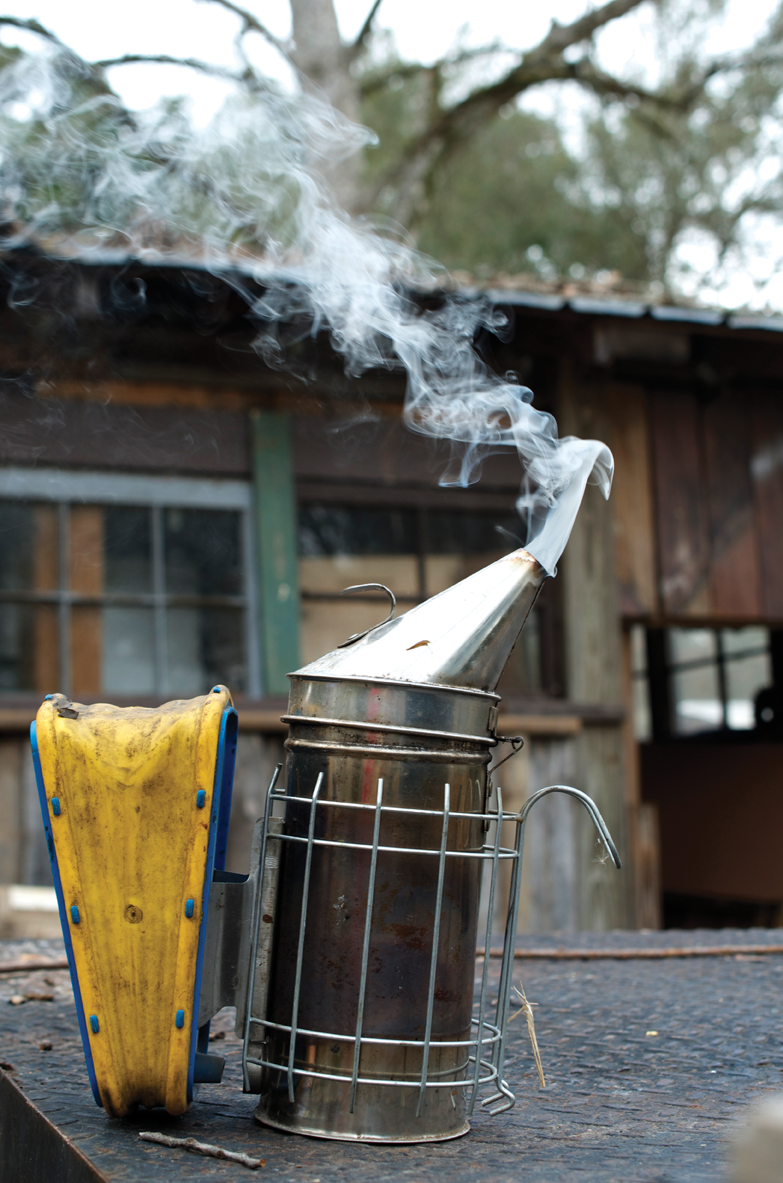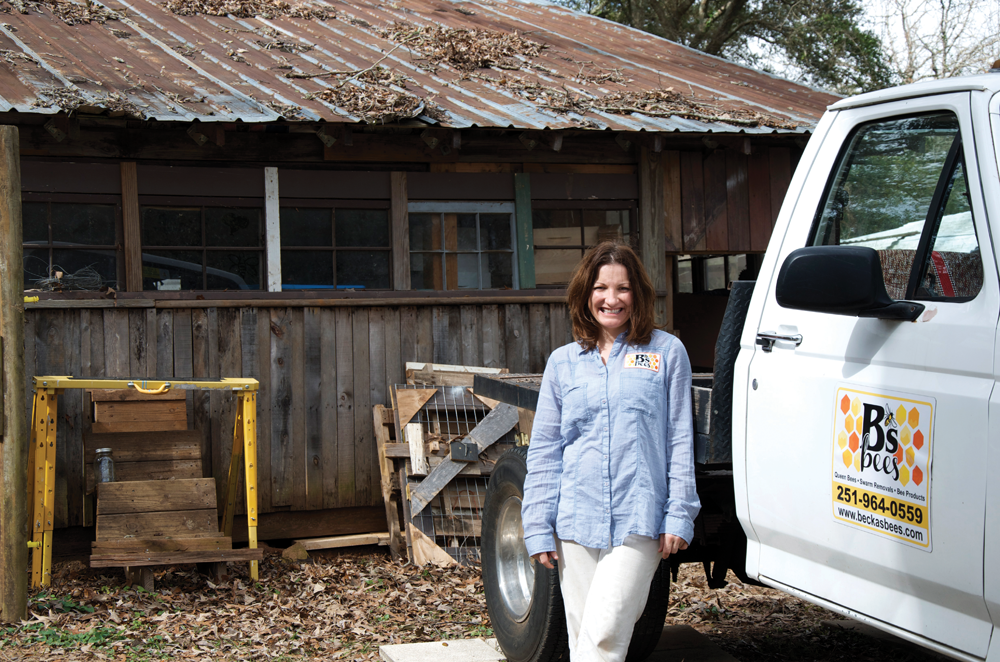
If you make blueberry pancakes for breakfast or pack an apple for lunch, you better thank a honeybee. Without them, many of your favorite fruits would not be able to grow. And local beekeeper Rebekah Hargraves is especially grateful for their contribution. “They’re the most fascinating creatures I’ve ever encountered, ” the Baldwin County Beekeepers Association president says, her voice light and excited. “They are so efficient, and they’re actually pretty docile.”
Efficient they are, working to pollinate as many as a few thousand flowers a day, including the plants for almonds, cherries, peaches and, of course, apples and blueberries, which are entirely dependent on our buzzy little friends. Our (tasty) way of life depends on these busy workers, which often rely on devoted beekeepers to survive and thrive.

|
Beekeeping Basics
Hargraves’ intro to the beekeeping world two years ago was a bit of a happy accident. After cultivating a garden and acquiring chickens, goats and turkeys, Hargraves noticed a swarm of bees had moved into her kitchen wall. “The way I saw it, these were my bees. They came to us. We wanted bees, and they were meant to be ours!” she says with a laugh. “So, we cut them out and put them in a hive. And now we’re beekeepers.”
For others, taking up this age-old hobby was born out of heritage. Ronnie Williams, a member of Mobile County Beekeepers, grew up with his grandfather keeping bees. “I was always around them as a little bitty fella, ” he says with the tone of a man who has happily told this story many times. “I was always piddling with them. In 2014, I got myself a nuc [or nucleus, a small hive colony], and now I grow ’em and sell ’em.”
For beekeepers in Alabama, finding local bee sellers is important. Alabama has “no comb” laws, which prohibit bringing established hives on the comb from other states. This effort to cut down on diseases and pests that harm the bees makes getting into beekeeping tricky for newbies. “When I was trying to find bees, I couldn’t get any because of the no comb laws. I thought, ‘If it’s that hard to find someone in Alabama, then I should sell bees, ’” Williams elaborates swiftly.
When asked why people should care about the work of these bees, each answered the same way, suggesting the reason should be obvious.
“They’re very crucial for our entire way of life, ” Darin Grant of the Mobile County Beekeepers Association says with zeal. “We depend on the bees for our food sources.”
Williams had similar notions. “If there were no bees to pollinate plants, you wouldn’t be alive.” Moreover, there has to be enough pollination for quality produce to grow, and to grow in the quantities needed in today’s agricultural market. Simply put, if the bees disappear, we’re in trouble.
DID YOU KNOW? When a honeybee stings, it leaves its stinger behind – along with some of its own abdomen. As a result, honeybees die soon after stinging a predator.

|
Bees in Trouble
The Gulf Coast provides these acclaimed insects with a wonderful habitat. From our mild winters that allow bees to forage every month of the year (if the temperature dips too low, usually lower than 50 degrees, they cannot fly) to the plethora of nectar plants for the bees to feast upon, the Bay area offers conditions that contribute to “a healthy bee supply, ” as Hargraves explains. However, other regions aren’t quite as rich in pollinators as ours. Some states receive bees by the truckload to help pollinate their crops. While this cross-country bee caravan is necessary for lucrative crops, it also contributes to the bees’ struggle for survival.
“Bees can contract parasites and pests of their own, problems that they haven’t always had. These weaken the bees’ immune systems so they’re more susceptible to viruses and sickness. Even pesticides that don’t kill the bees may weaken them, ” Hargraves shares. “Whatever a bee walks on, when they get back to the hive, they leave traces. And just a little bit of poison, on top of a little bit of poison, creates cumulative issues.”
The term colony collapse disorder refers to the increasing loss of bees in recent decades. Since 2011, around 33 percent of managed hives (or, hives with beekeepers) were lost each year, according to the U.S. Department of Agriculture. Over the last 75 years, in fact, the number of managed honeybee colonies has declined by half, while demand for pollination and crops increases. While some researchers are hard at work breeding bees with “hygienic traits” — the ability to clean themselves and fight off mites that would harm or kill them — the most effective way to keep the bees strong is to simply know them.
“All the books and websites can help, but you need to know what’s happening in your own hive. Beekeeping is very local, ” Hargraves shares.
DID YOU KNOW? In the 1940s, there were 5 million managed honeybee hives in the United States. Only about 2.5 million remain today.

B’s Bees, specializes in removing bee swarms that have moved into people’s homes.
Itching to Get Started
Hargraves, Grant and Williams are just a few local beekeepers who have made this hobby a major part of their lives. Hargraves owns her own bee removal business, B’s Bees. “Once I started beekeeping, I got over the rest of the farm scene. I sold my goats and turkeys and half my chickens. I didn’t care about them anymore. I’d found my passion, and everything else was taking too much time.”
Besides taking care of their hives, these beekeepers have something else in common: they enjoy recruiting new members to their inclusive bee community. “If I had to entice someone to join, ” Grant says thoughtfully, “I’d bring them over and show them my hive.” His impressive, glassed-in hive sits inside his home with a tube leading outside, allowing bees to come and go as they please. “To most people, it just looks like a bunch of insects running around, but I can show them the queen, and the dance they do to tell the others where to get nectar from miles away. Their lives are actually very detailed.”
Indeed, many people associate beekeepers with men from the ’70s, stalking about in plastic suits and netted facemasks; today’s beekeepers are a completely different animal, though. “We need more bees and more beekeepers, ” Hargraves admits. “People are scared of stinging insects and don’t take the time to learn about honeybees. But they don’t want to sting you — they don’t want to die!” she laughs.
“We need more young people and more women, ” Hargraves finishes. “Now is a great time to get started!”
DID YOU KNOW? Honey never spoils! Pick up a jar of locally made honey at the farmers market, starting in April.





